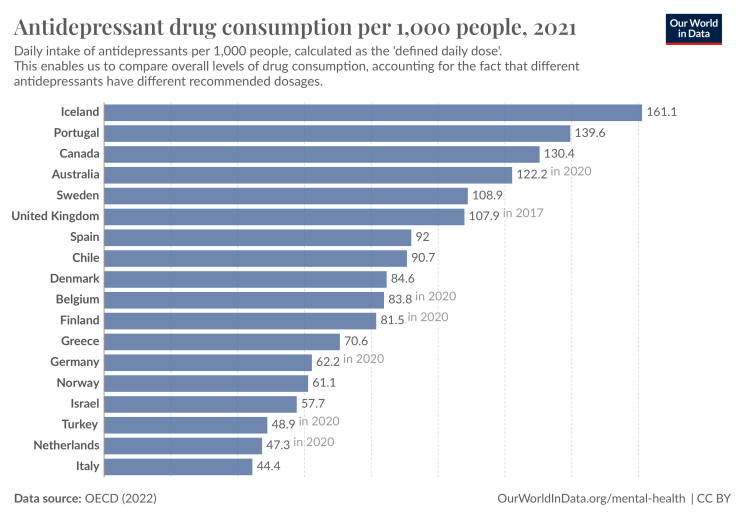Top 10 Countries With The Most Prescribed Anti-Depressants: Did Yours Make The List?
More than 10 per cent of the UK's population are on anti-depressants

According to official figures published by Our World in Data, Iceland has the largest share of citizens on proscribed anti-depressants.
The figures compiled by Our World in Data studied the number of anti-depressant prescriptions given out in 22 countries across the globe. As part of the study, the drug handouts were broken down at a rate per 1,000 people.
The figures also used data from the Organisation for Economic Co-operation and Development (OECD) and showed that around one in six people in Iceland were on proscribed medication for depression.
The OECD also confirmed that Iceland has the highest rate of anti-depressant use, with 161.1 scripts per 1,000 people.
Researchers predicted that the Nordic Island nation, home to less than 400,000 residents, topped the list due to its notoriously long and dark winters.
According to experts at the American Psychiatric Association, seasonal depression can affect up to 10 to 20 per cent of adults.
While seasonal depression, also known as seasonal affective disorder (SAD), is most common during winter, symptoms can last for roughly 40 per cent of the year.
However, some experts have since argued that Iceland's cheap anti-depressant prescriptions are a leading factor towards the alarming rate of sadness.
Al Jazeera also estimates that drug prices in Iceland are seven times cheaper than therapy, which could explain why so many residents take them.

Portugal and Canada fell closely behind, with 139 and 130 anti-depressant handouts per 1,000 people, respectively.
While the US is often labelled the most depressed or drugged-up nation, North America was ranked fifth place.
The figures exposed that North America has a depression rate of 110 for every 1,000 people - roughly 11 per cent of the population.
The US findings come as a staggering 30 per cent of Americans reported that they have suffered from clinical depression at some point in their lives. One in five US nationals also said that they are currently tackling the mental health disorder.
The UK came in two spots below the US.
With 108 prescriptions for every 1,000 Britons and more than 10 per cent of the population on anti-depressant prescriptions, the UK was put in seventh place.
South Korea was listed as the least depressed nation and took the bottom spot with 27 prescriptions per 1,000 nationals. However, researchers noted that in South Korea, anti-depressants, depression and therapy are considered taboo topics in society.
Researchers who contributed to a European Journal of Public Health study on the depression rate in South Korea said that the low rate was due to the drugs not being available in all areas of the country.
Anti-depressants are not limited to relieving symptoms of depression and are often used to support those struggling with other mental health conditions, including anxiety and sleeping disorders.
Data published by the Organisation for Economic Co-operation and Development (OECD) shows that the number of people taking anti-depressants increased by almost 250 per cent in the 20 years between 2000 and 2020.
The two main classes of anti-depressants, which each work to boost norepinephrine and serotonin levels, are tricyclic anti-depressants and selective serotonin reuptake inhibitors (SSRIs).
Notorious for its intense side effects, including bed-wetting, sleep issues, chronic pain and insomnia, tricyclic anti-depressants are prescribed less than SSRIs.
SSRIs are also known to cause a range of side effects, from headaches, dizziness and nausea to diarrhoea, weight gain and loss of appetite.
© Copyright IBTimes 2025. All rights reserved.






















